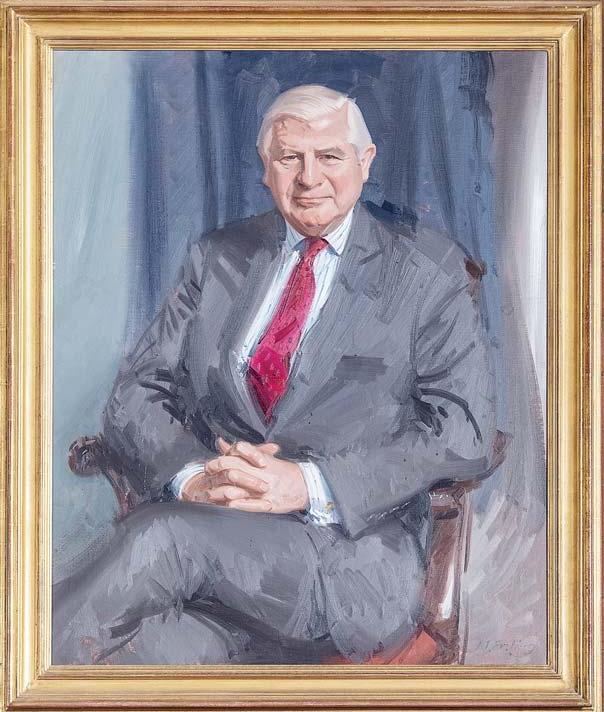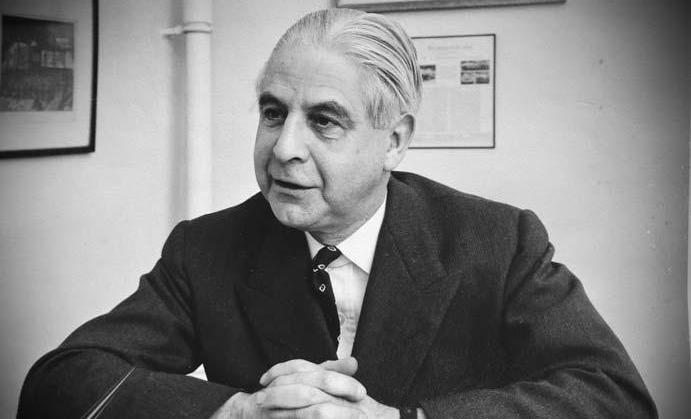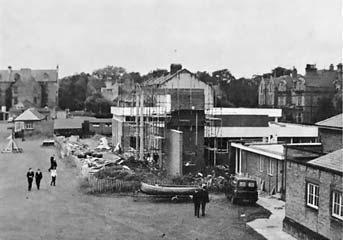
6 minute read
THE FENWICK FACTOR DAVID GOLDWATER & ADAM FENWICK
THE FENWICK FACTOR
THE EDITOR WITH ADAM FENWICK
Advertisement
Fenwick of Newcastle is an institution synonymous with the City, once referred to as ‘a City in Itself’ and three generations of the Fenwick family have served as RGS Governors establishing a unique and enduring link with the RGS Family.
This is a brief look at the Fenwicks’ role in shaping the RGS of today. It was Trevor Fenwick (1901-79), who became involved via his role as a Councillor on Newcastle City Council when the school still had grantmaintained support. Older ONs will remember his active role in the 1950s and 60s and he and Mrs Fenwick were regular visitors to school events, especially Speech Days. He instituted the Trevor Fenwick Economics Prize, maintained by the family to this day. As his grandson Adam testifies, ‘it was testament to his desire to ensure that pupils had the opportunity to study the subject and recognise academic achievement. Trevor enjoyed a keen interest in English Literature, acquired at Cambridge and RGS’s academic prowess would have appealed to him.’ Trevor’s son, John James Fenwick CBE, named after his grandfather (1846-1905) and founder of the company in 1882 was extremely happy to be invited to join the Governing Body.
‘My father was delighted when invited to join the Governing Body in 1975. He longed to have been a pupil at the School and indeed my grandparents were set on this course. But as luck would have it, the outbreak of the Second World War saw the School evacuated to Penrith. As my father’s great uncle was based in North Northumberland and this was where Newcastle Prep School (NPS) had chosen to evacuate, it was understandable they chose NPS. Once the war was over and my father had returned to the NPS site in Newcastle, he recounts wistfully looking over the road to the RGS.
It was Professor Stanley Dennison CBE (Professor of Economics at Newcastle University), my father’s predecessor as Chairman of Governors who afforded him the considerable honour of being his successor. Stanley had taught my father economics at Pembroke College, Cambridge and they became firm friends when Stanley took up a post at Newcastle University. I know that my father’s 13 years in the Chair is an experience he has always deeply cherished. He feels enormously
fortunate to have had the opportunity to serve the RGS and work with two outstanding Headmasters Alister Cox (7294) and James Miller (94-08).
He has always recognised the vital role the RGS plays in contributing to the strength of the North East region. He is a passionate advocate of the North East region and its ability to compete at a national level. The quality of its educational provision to him was a key pillar in both attracting talent to the region and nurturing local talent. During his 13 year tenure as Chair, he wanted to do everything possible to ensure that the RGS was the standard bearer for the region’s independent education sector and recognised as one of the leading institutions on the national stage. He threw all his support behind the respective Headmasters to ensure the sound stewardship of the School and the efficient use of all available resources. No one was left in any doubt that ‘detail’ mattered and cost management became a key focus of attention. Richard Metcalfe (99-16) former Bursar referred to this culture as the ‘Fenwick Way’ and I heard it referenced on many occasions during my eight years as Governor.
He was also keen to encourage his Headmasters to search far and wide for the best teaching talent. Perhaps he was setting an example when he drove to South Wales personally to persuade James Miller to take up the Headmaster’s position. My father was very clear that to enrich and improve academic output required the best teachers and that started with the Head. Performance in the Independent Schools’ League table was carefully scrutinised. I know he is very proud of the various building development programmes that were undertaken with James Miller and the raising of funds to complete the projects. But critically the buildings had to be affordable and the construction projects rigorously managed. It was all part of ensuring that pupils and staff had modern facilities for the provision of a rich and diverse education experience both academic and extra-curricular. Overseas trips for pupils were also separately encouraged to broaden horizons.
My father was a passionate supporter of the Bursary Campaign so that an RGS education was accessible to all socioeconomic sectors irrespective of means. It was also early days for diversity and inclusion but James and he were deeply committed to open access to the RGS for all in the community. He was of course Chairman when the decision was taken to move to co-education and although he had stepped down before the first girls were admitted, much of the planning and groundwork went on under his watch. My father was a great believer in getting around the School to find out what was really going on and to recognise the contributions that were being made from top to bottom. He could often be found chatting with teaching staff in the Common Room or staff in the kitchens. Likewise, attending as many School events as possible to meet parents and stakeholders of the RGS community.
He looks back with pride on his period of stewardship of the School and is deeply grateful for the support that he received from his Governing Body and the relationship with James and Alister Cox built on trust, mutual respect and great friendship which endures to this day.’ Commenting on his own eight years as an RGS Governor, Adam adds ‘It was a great privilege to serve on the Governing Body, maintaining a family tradition and having the opportunity to contribute to the School’s ongoing success. It was immensely rewarding not least working with Governor colleagues who had a diverse range of skills, ably led by Louis Taylor (75-85) and then Paul Walker, as Chairman. (Louis’ uncle Arthur C Taylor (33-41) had served with his father John as Deputy Chairman of Governors). The RGS quickly gets under your skin and I found myself swept along by the collective energy, inspiration and dedication that has underpinned its achievement over many decades. There was lots going from building developments through to outstanding educational attainment and an array of extra-curricular activity. An excellent and mutually reinforcing relationship had been built between the Governing Body and Headmaster Bernard Trafford’s (08-17) team. We all found ways to contribute in a stimulating environment and the sense of responsibility was palpable. The RGS is highly regarded within the Independent sector and one of the North East’s great success stories. I was proud to be involved and remain an interested observer of its continuing vitality and distinguished performance.’
ONs Ian J Dixon (47-57), Fenwick Company Secretary and Peter G Coates (56-67), Group Chief Accountant, each serving the Fenwick company for many years.
My father was a passionate supporter of the Bursary Scheme so that an RGS education was accessible to all socio- economic sectors irrespective of means.”
The next issue of ONA Magazine (Autumn 2021) will commemorate 20 years of coeducation at the RGS and will feature more on the Fenwick family’s contribution.
Trevor Fenwick











